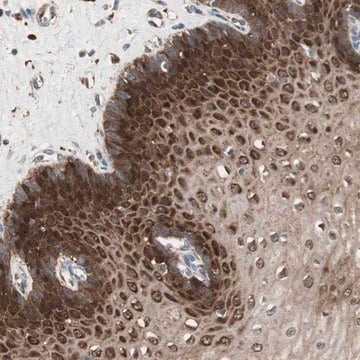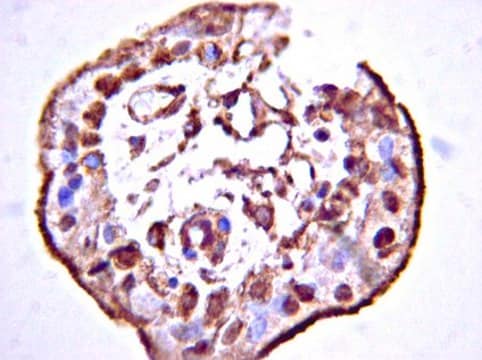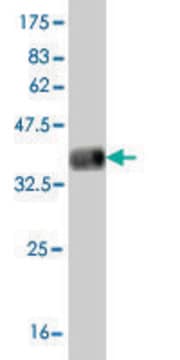SAB1401583
Monoclonal Anti-STAB1 antibody produced in mouse
clone 4G9, purified immunoglobulin, buffered aqueous solution
Synonym(s):
CLEVER-1, FEEL-1, FELE-1, FEX1, KIAA0246, STAB-1
About This Item
Recommended Products
biological source
mouse
Quality Level
conjugate
unconjugated
antibody form
purified immunoglobulin
antibody product type
primary antibodies
clone
4G9, monoclonal
form
buffered aqueous solution
species reactivity
human
technique(s)
capture ELISA: suitable
immunofluorescence: suitable
western blot: 1-5 μg/mL
isotype
IgG2aκ
NCBI accession no.
UniProt accession no.
shipped in
dry ice
storage temp.
−20°C
target post-translational modification
unmodified
Gene Information
human ... STAB1(23166)
General description
Stabilin 1 (STAB1) is expressed on tissue macrophages and sinusoidal endothelial cells. It is a type-1 transmembrane receptor. STAB1 is expressed in alternatively activated macrophages. STAB1 gene is located on human chromosome 3p21.1.
Immunogen
Sequence
EALASDLPNLGPLRTMHGTPISFSCSRTRAGELMVGEDDARIVQRHLPFEGGLAYGIDQLLEPPGLGARCDHFETRPLRLNTCSICGLEPPCPEGSQEQ
Biochem/physiol Actions
Physical form
Disclaimer
Not finding the right product?
Try our Product Selector Tool.
Storage Class Code
10 - Combustible liquids
Flash Point(F)
Not applicable
Flash Point(C)
Not applicable
Certificates of Analysis (COA)
Search for Certificates of Analysis (COA) by entering the products Lot/Batch Number. Lot and Batch Numbers can be found on a product’s label following the words ‘Lot’ or ‘Batch’.
Already Own This Product?
Find documentation for the products that you have recently purchased in the Document Library.
Our team of scientists has experience in all areas of research including Life Science, Material Science, Chemical Synthesis, Chromatography, Analytical and many others.
Contact Technical Service








